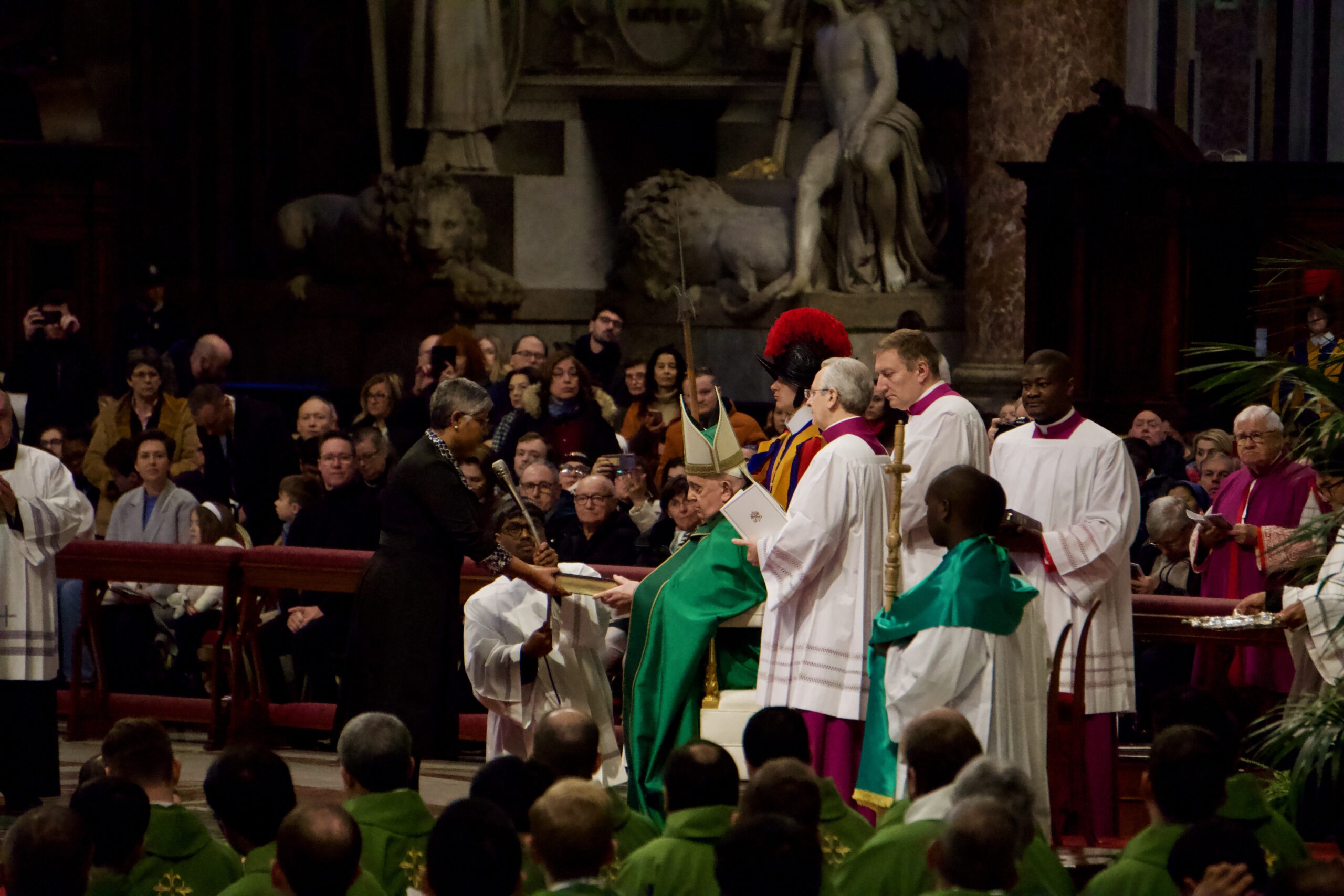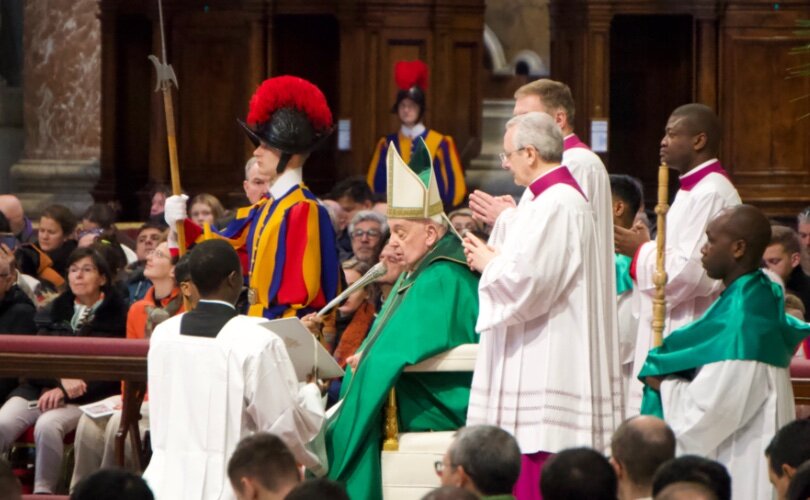VATICAN CITY (LifeSiteNews) — Pope Francis instituted men and women in the ministries of lector and catechist in the Vatican Sunday, continuing the practice he began following his 2021 changes to Canon Law which has been described as continuing “the pattern of rupture from Catholic tradition.”
On January 21, Pope Francis instituted two women as lectors, along with seven women and two men as catechists. The individuals heralded from countries such as Jamaica, Brazil, Korea, Chad, Trinidad and Tobago, Bolivia, and Germany.
“Now you, by becoming readers, that is, proclaimers of the word of God, are called to cooperate in this primary commitment in the Church and therefore you will be invested with a special office, which puts you at the service of the faith, which has its root and foundation in the word of God,” Francis said to the lectors during the exhortation ceremony.
“You will proclaim the word of God in the liturgical assembly,” Francis continued. “You will educate children and adults in the faith and guide them to receive worthily the sacraments; you will bring the missionary proclamation of the Gospel of salvation to the men who do not yet know him.”



The ceremony took place on what is now denoted as the Sunday of the Word of God, the designation the Pope gave to this particular Sunday in the Novus Ordo calendar in 2019.
“Brothers and sisters, may the Sunday of the Word of God help us to return with joy to the sources of our faith, which is born of listening to Jesus, the living Word of God,” Francis stated during his homily. “May it help us, barraged by words about the Church, to rediscover the word of life that resounds in the Church.”
The institution of women as lectors and also as acolytes is a modern novelty resulting from Pope Francis’ 2021 changes to the Church’s Canon Law, as outlined in his motu proprio Spiritus Domini. A subsequent motu proprio later that same year – Antiquum ministerium – provided for the formal institution of women as catechists, resulting in the first institution of women in the roles in 2022.
READ: Pope Francis opens up formerly male liturgical roles to women
While the practice of women performing public roles in the liturgy has been widespread for many years in the Novus Ordo, Francis’ 2021 motu proprios formalized the practice and officially opened up to women roles formerly reserved for men.
The move simultaneously provided further fuel for speculation about the future possibility of female deacons: something which the Catholic Church clearly teaches is impossible, but which is a fact that fails to prevent activists both clerical and lay from consistently demanding female deacons.
The Pope’s move was welcomed and defended by the Pontifical Council for Promoting the New Evangelization, who stated that Francis was building on a “well-established practice in the Church,” which had “confirmed that lay ministries, founded on the sacrament of Baptism, can be entrusted to all the faithful who are suitable, whether male or female, according to what is already implicitly indicated by canon 230 of the Code of Canon Law, which the Pope has modified for the occasion.”

Writing in 2021 to then-prefect of the Congregation for the Doctrine of the Faith (CDF), Cardinal Luis Ladaria Ferrer, Francis explained that Spiritus Domini was following the lines of thought of Vatican II along with the controversial 2019 Synod on the Amazon: “in the horizon of renewal outlined by the Second Vatican Council, one feels ever greater today the urgency to rediscover the co-responsibility of all the baptized in the Church, and particularly the mission of the laity.”
While admitting the impossibility of female ordination, Francis stated that admittance of women “for the non-ordained ministries it is possible, and today it seems opportune to surpass this reservation.”
“This reservation,” he said, “had its meaning in a specific context but may be reconsidered in new contexts, however, always having as a criterion fidelity to the mandate of Christ and the will to live and proclaim the Gospel imparted by the Apostles and entrusted to the Church so that it may be religiously heeded, devoutly safeguarded, faithfully proclaimed.”
Francis also highlighted themes which have more recently resurfaced as part of the Synod on Synodality, while stating that “the choice to confer also to women these offices, which entail stability, public recognition and a mandate on the part of the Bishop, renders more effective in the Church everyone’s participation in the work of evangelization.”
Writing shortly after the release of Spiritus Domini in 2021, liturgist and theologian Dr. Peter Kwasniewski warned that the Pope’s altering of Canon Law to push women through the liturgical ministries “fits snugly into this larger pattern of rupture from Catholic tradition.”
In his book-length response to the role of women and the traditional Catholic teaching on reserving the liturgical ministries to men only, Kwasniewski stated that the Pope’s 2021 changes – particularly with regard instituting women as lectors and acolytes – represent “a tectonic shift both in theology and in praxis.”
While Francis had drawn heavily on the texts of Pope Paul VI and Vatican II, Kwasniewski wrote that the innovations were contrary to Scripture:
The liturgical service of women in the Eucharistic liturgy, as reader and as acolyte and servant at the altar, was altogether excluded in the theological reasoning of the whole Old Testament and New Testament traditions and of the two-thousand-year-old Eastern and Western tradition of the Church.
He accused the change of working against the unity of the Church, warning that it implicitly introduces a category of “second class citizens” amongst the faithful:
The motu proprio Spiritus Domini therefore commits a double categorical error by conflating the dignity of the baptized with the dignity of active liturgical ministry. On the one hand, it implies that only the baptized who take up instituted ministries are fulfilling their proper lay vocation as fully as they might: they become clerical, to the extent possible, in order to be fully lay.
On the other hand, it implies that the laity who choose simply to receive the gifts of grace provided in the liturgy — to be, in other words, just like the Virgin Mary — are second-class citizens in the Church, men and women who have not embraced their calling to be “engaged,” to “exercise” their rights, to “participate” in a leadership role.”

The liturgist suggested that Spiritus Domini and its accompanying change to Canon Law “make[] sense only in the context of a liturgy that has lost its raison d’être and is struggling to be something to anyone.”
Indeed, while Francis argued that his changes to Canon Law would assist the universal role of evangelizing, Kwasniewski attested that the laity were being encouraged to assume roles not proper to them:
In spite of Pope Francis’s talk about the “co-responsibility” of the ordained and the lay faithful, we may say that the true responsibility of the laity is not taking up tasks inside the church but taking on the world outside the church. Conversely, priests should not normally be significantly invested in secular affairs, even highly worthwhile ones.
The horizontalist social-worker model of the priesthood — popular after the Second Vatican Council — leads to the worst kind of clericalism, in which the clergy have to get involved in everything (including what is more proper to the laity) and in which the laity, in turn, feel they must emulate the clergy and take on quasi-clerical functions in order to have worth or be contributing to the life of the parish.

